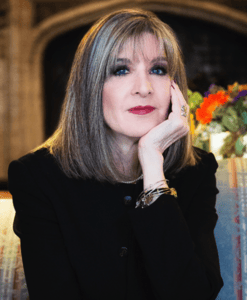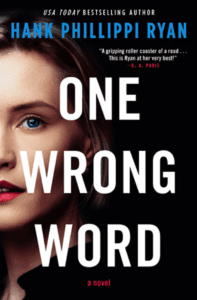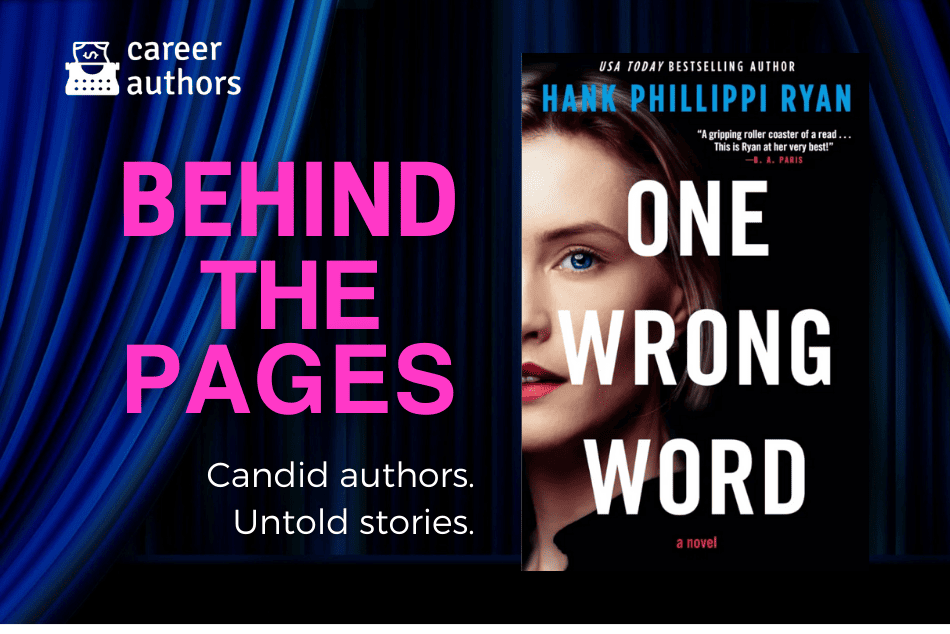Today we celebrate Hank Phillippi Ryan’s ONE WRONG WORD—her latest and greatest psychological thriller. In addition to being one of the industry’s most generous and supportive authors, Hank is an incredibly gifted storyteller. So let’s give her a virtual round of applause and join me for a peek “Behind the Pages” to learn all about ONE WRONG WORD.
1. What’s the title of your book—and was that always the title?
The title is ONE WRONG WORD. And yes, that was always the title.
Funnily enough, I’m pretty sure I had the title before I had the book.
It often happens that I discover the title for the next book in the book I’m working on. In THE HOUSE GUEST, someone realizes how powerful words are, and how one wrong word can be like a guillotine. And I thought, wow. ONE WRONG WORD. Great title. It has built-in conflict, and built-in disequilibrium. That’s my next book!
Then I thought: I wonder what it’ll be about.
2. Who’s the main character of your book—and was that always their name?
The main character’s name is Arden Ward. She is an experienced and savvy crisis management expert who is forced to solve a crisis in her own life.
On my bulletin board next to my desk is a piece of scratch paper that has– counting now–23 women’s names, all of which begin with the letter A. I just stream of consciousnessed the names. “Arden” is name #2 on the list. And it is also #11. And it has a star and a circle by it.
I wanted unique. And strong. And when it works on the page, you know you got it right.
3. At the start of the book, what’s the character’s goal?
Arden has been unfairly fired after being unjustly accused of having a scandalous affair with the powerful client.
At the beginning of the book, she’s trying to save her career and her reputation— she’s worked her entire professional life to have the success she has gained, and now, with one wrong word, it’s about to be taken away from her. She’s enraged, and understands that she’s being made the victim –her boss has decided he’d rather get rid of Arden than lose a lucrative client. And that is a tough life lesson.
4. What was the core idea for this novel—a plot point? a theme?—and where did it come from?
Well, this was kind of a time-release idea.
First I started thinking about controversial jury verdicts. About no matter what the verdict in a big newsworthy case, often the court of public opinion has a different idea. Oh, we say, that guy got off easy. Or that woman certainly skated. We decide they’re connected somehow, or powerful, or paid someone off, or got lucky because they’re wealthy or privileged or famous. Why is that, I wondered, why do we rarely believe the jury?
Then I started thinking about the power of words. How they can be just as violent as destructive a weapon as a gun or a knife. That’s a weapon we all have, isn’t it? Words? And it’s our job to decide whether to use them for good or evil.
And I know how devastating a rumor can be. We’ve all had someone say something about us that’s untrue, horribly untrue. Or unfair. And we feel so powerless –how do you defend yourself? It’s incredibly difficult.
And I know there are crisis management experts who repair the reputation of big shots who have made a mistake—high-powered executives for instance, or politicians or movie stars. What if an honorable crisis management expert was forced to use her skills to protect a bad guy?
But the time release part came when I was in the midst of writing that story.
I remembered when I was 19. In one of my first jobs, I worked in a high-stress high- stakes high-powered political campaign. I was a worker bee, and happy with that. But one day I overheard two campaign bigwigs chatting, and they were gossiping. About me!
They alluded to another campaign bigwig, “Jim,” who, they said, had a huge crush on me. (Of course, I stopped and listened.) Because this was all new to me. Crush? I was baffled. On me? I had NO idea about this.
So the other one said: “Well, if Jim’s wife hears about this, it’ll be a disaster.”
And the other guy said, “True. Maybe we should fire Hank.”
And I remember thinking– fire me? Me? I think Jim is your problem.
As it turned out no one got fired. But that has stayed with me, so profoundly, since then.
And I realized in ONE WRONG WORD, I was having Arden Ward do what I should have done. Defend herself. Take her power back. And it was truly rewarding to write.
(Of course, in real life, no one got killed.)
5. At what point did you come up with the final version of the first line? What is it?
The first line is “Regret has consumed him, and fear, too, and Cordelia wishes she could let her husband know how well she understands his spiraling terror.”
I came up with that right after I typed the words Chapter One. And it never changed. What did change, hilariously, is what the line turned out to mean. More I cannot say.
6. Did you know the ending of the book when you started?
Not at all. Not one bit. I didn’t even know who died, much less who was guilty. I didn’t know who was good or bad. I didn’t know anything!
I just sit down at my computer and see what happens, what someone wants and how far they’ll go to get it. But I will admit there was a seriously terrifying week when I wondered if I had created a murder mystery that I could not solve.
7. What’s something in this book that you’ve never done before?
This book is in three points of view: Arden Ward, the crisis management expert; Cordelia Bannister, the wife whose husband’s controversial verdict has ruined her life; and Monelle Churchwood, a determined and obsessive District Attorney. Three smart women, all of whom want something–but only one of them can prevail. And when they do, the other two will lose.
I love playing with structure, and this book moves relentlessly forward. There are absolutely no flashbacks or scenes that take place outside of the timeline of the story.
8. What part of your tour (or launch week) are you most excited about?
Well, it’s amazing! Tuesday, February 6th, I am going on the Tamron Hall show! I’m nervous and excited, but Tamron is a rock star and I know it will be fabulous. Then I am on the road for essentially a month, in nine states with so many events! What I’m looking forward to–is seeing if I can do it!
Seriously: What an absolute magical mystery tour, and I cannot wait to see everyone.
9. Who in your #writingcommunity deserves a special shout-out for supporting you in writing this story? Why?
All of you, darling Career Authors! Readers, you should know we meet every Monday morning on zoom at 10:00 AM to discuss all things bookish and all things our lives, and you all listened to me whining about how the book would never be done, how I could never come up with the ending, and how I should just give up. Clearly you were valuable shepherds.
10. How do you want readers to feel when they close the book?
Empowered. Totally empowered. I want you to punch your fist in the air and say yes, that’s exactly what should have happened.
And then, have a moment when you think wow–I should have seen that coming! How did Hank do that?
I want you to miss your stop on the subway because you cannot stop reading.
And I admit I want you to also think: when’s Hank’s next book available?
11. What did youlearn from this book? About writing, or life, or the writing life?
There’s a wonderful quote from Thomas Edison who said “When you think you have exhausted all of the possibilities, remember this, you haven’t.”
To me, that means it’s not that you can’t solve a problem, it’s just that you haven’t figured it out yet. and that’s especially valuable for a pantser like me, who sits down every day with the audacious belief that I can actually write a book.
So I have learned to embrace the panic. Because I realized I’ve thought “I’m doomed” while writing every one of my books. And I fifteen times, it turned out I was wrong. So now when the panic arrives, I think: hurray! The answer is about to be revealed.
 HANK PHILLIPPI RYAN is the USA Today bestselling author of 15 psychological thrillers, winning the most prestigious awards in the genre: five Agathas, five Anthonys, and the coveted Mary Higgins Clark Award. She is also on-air investigative reporter for Boston’s WHDH-TV, with 37 EMMYs and dozens more journalism honors. National book critics call her “a superb and gifted storyteller” and “master of suspense.” She’s the only author to win the Agatha in four categories: Best First, Best Novel, Best Short Story and Best Non-Fiction. Her newest is the page-turning
HANK PHILLIPPI RYAN is the USA Today bestselling author of 15 psychological thrillers, winning the most prestigious awards in the genre: five Agathas, five Anthonys, and the coveted Mary Higgins Clark Award. She is also on-air investigative reporter for Boston’s WHDH-TV, with 37 EMMYs and dozens more journalism honors. National book critics call her “a superb and gifted storyteller” and “master of suspense.” She’s the only author to win the Agatha in four categories: Best First, Best Novel, Best Short Story and Best Non-Fiction. Her newest is the page-turning  standalone thriller One Wrong Word—a twisty non-stop story of gaslighting, manipulation, and murder. David Baldacci says, “A story with all the goods… Buckle up and read.” B.A. Paris says, “A gripping rollercoaster of a read… This is Hank at her very best!” And James Patterson says, “If you’re looking for riveting suspense that keeps you up late—in One Wrong Word you get your wish.”
standalone thriller One Wrong Word—a twisty non-stop story of gaslighting, manipulation, and murder. David Baldacci says, “A story with all the goods… Buckle up and read.” B.A. Paris says, “A gripping rollercoaster of a read… This is Hank at her very best!” And James Patterson says, “If you’re looking for riveting suspense that keeps you up late—in One Wrong Word you get your wish.”





